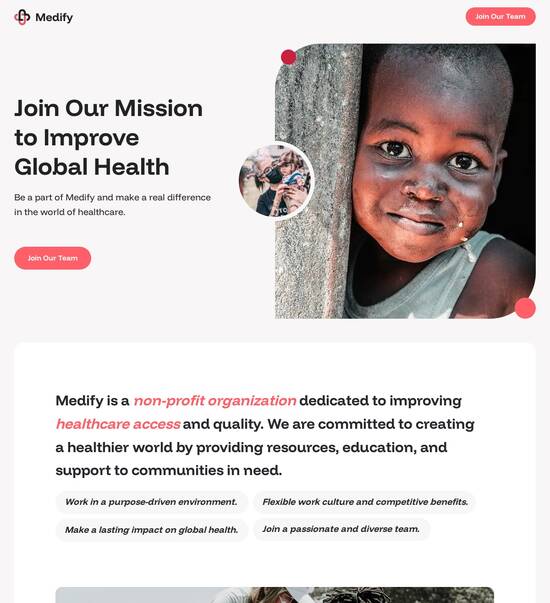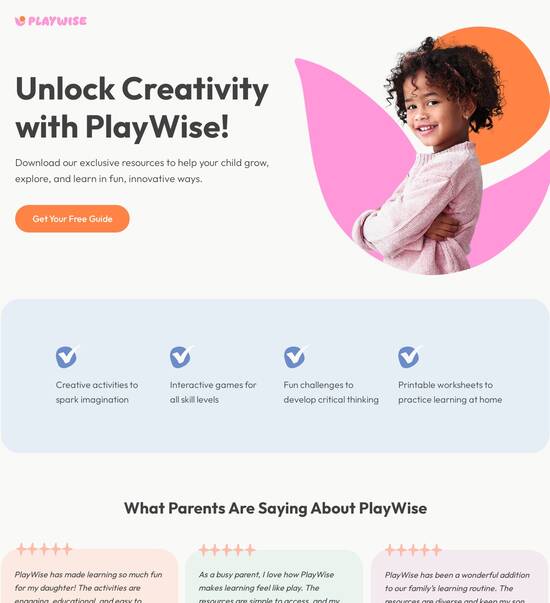
React.js optimized wiki page template
Explore Similar TemplatesAbout template
Supercharge your wiki page with React.js for outstanding performance! Learn more today.
Recommended templates

Easy to build without coding
With the intuitive drag-and-drop builder, anyone on your team can create high-converting pages without any knowledge of code or design. Make enhancements to your landing page with custom widgets using Javascript, HTML/CSS, or third-party scripts.

Multiple layouts for any industry and goal
Select from 500+ landing page layouts built to boost conversions across industry-specific scenarios. Customize them by adjusting fonts, adding images, and generating on-brand content with the AI assistant. Quickly scale with Instablocks® and Global Blocks that you can save, reuse, and update globally.

Loads fast and looks polished on any device
Every template is responsive, which means they present professionally on any device and load blazingly fast with our Thor Render Engine. You can also power them up with Google AMP technology to deliver an unparalleled mobile experience and drive higher conversions.

Robust analytics & experimentation
Get real-time updates and reporting across all your devices, showing the number of visitors, conversions, cost-per-visitor, and cost-per-lead. Launch AI-powered experiments, run A/B tests, and use heatmaps to analyze user behavior, then optimize your landing page to maximize conversions.







Easy to build without coding
With the intuitive drag-and-drop builder, anyone on your team can create high-converting pages without any knowledge of code or design. Make enhancements to your landing page with custom widgets using Javascript, HTML/CSS, or third-party scripts.
Multiple layouts for any industry and goal
Select from 500+ landing page layouts built to boost conversions across industry-specific scenarios. Customize them by adjusting fonts, adding images, and generating on-brand content with the AI assistant. Quickly scale with Instablocks® and Global Blocks that you can save, reuse, and update globally.
Loads fast and looks polished on any device
Every template is responsive, which means they present professionally on any device and load blazingly fast with our Thor Render Engine.
Robust analytics & experimentation
Get real-time updates and reporting across all your devices, showing the number of visitors, conversions, cost-per-visitor, and cost-per-lead. Launch AI-powered experiments, run A/B tests, and use heatmaps to analyze user behavior, then optimize your landing page to maximize conversions.
All the features you need to build react js wiki
Explore more featuresLearn how to build reactjs wiki
Frequently asked questions about wiki templates download
Leading the way in building high-performing landing pages





Wiki js templates: Your ultimate how-to guide
In a competitive digital landscape, the effectiveness of your marketing campaigns often hinges on the quality of your landing pages. Instapage stands out as the leading platform designed to empower digital marketers by creating high-converting landing pages that not only attract but also engage visitors effectively. This step-by-step guide provides valuable insights on how to leverage Instapage for superior campaign outcomes.
Understanding Service Components of Instapage
Instapage provides marketers access to essential tools that enhance conversion rates through optimized landing page structures. One can utilize an extensive library of over 100 conversion-focused templates and intuitive builders to craft compelling landing pages quickly.
- High-quality templates: Instapage offers a wide selection of professionally designed templates that are proven to convert. These templates cater to various industries from education to tech.
- Lead generation elements: Build rich lead capture forms and pop-ups that integrate seamlessly into your existing campaigns, helping you gather more contacts efficiently.
- Built-in optimization tools: Utilize A/B testing and heatmaps to refine your landing pages continually and maximize your return on investment.
Step 1: Creating Your First Landing Page
To start utilizing Instapage effectively, you need to create your first landing page. Choose a template from the extensive library that matches your campaign goals, or begin from scratch using the intuitive drag-and-drop editor.
Step 2: Optimize for Higher Conversions
Focus on A/B testing to ascertain which elements drive the best results.
- Test different headlines: Change the text and see what resonates with your audience to maximize engagement.
- Adjust CTAs: Experiment with call-to-action buttons – changing their color, text, or position can impact click-through rates.
- Analyze page behavior: Use heatmaps to understand what areas attract the most attention and adjust your layout accordingly.
Step 3: Personalization and Collaboration
Crafting highly personalized experiences for visitors can significantly enhance engagement. Instapage allows marketers to personalize content based on user behavior.
- Dynamic text replacement: Customize headlines or content based on different sources like ad campaigns or user segments.
- Collaborate seamlessly: Share drafts with your team and get real-time feedback to enhance the development process.
- Tailored content experiences: Use audience insights to provide unique content tailored for different market segments.
Unlock the full potential of your digital marketing strategies by implementing the above steps to create landing pages that turn visitors into customers.
Ready to drive your marketing campaigns to the next level? Start utilizing Instapage today for optimized landing pages that deliver results.
People also ask about wiki js template
Creating an optimized ReactJS wiki page template
I. The evolution of wiki pages in web development
Wiki pages have a storied history in the realm of web development, tracing their origins to the early 1990s when Ward Cunningham introduced the first wiki software. These collaborative platforms allowed users to create content easily and collaboratively, transforming how information is shared online. Just as the internet evolved, so did the concept of wikis, shifting from static entries to more dynamic and interactive platforms.
The rise of social media and user-generated content has further propelled the evolution of wiki pages. As more individuals sought to contribute knowledge and engage with others, the formal structure of traditional wikis began to blend with elements of modern web applications, including real-time collaboration and multimedia integration.
Optimization has become critical in this transformation, particularly concerning user experience and accessibility. An optimized wiki is not just faster; it is more intuitive, allowing users to navigate and find information seamlessly. The implications for search engine optimization (SEO) are equally significant; greater visibility leads to increased traffic, which is fundamental for informative wiki pages. Thus, the evolution of wiki pages in web development is marked by a continuous need for enhancement, ensuring that they remain relevant and useful.
II. ReactJS: A game-changer for dynamic content
ReactJS has emerged as a vital tool for modern web development, especially when it comes to creating dynamic content. At its core, React is built on a component-based architecture, which allows developers to break down complex user interfaces into simpler, reusable parts. This modular approach is essential for maintaining scalability and manageability in large applications, like those used for wikis.
Another key element of ReactJS is its Virtual DOM, which significantly enhances performance. By minimizing direct access to the actual DOM, React can efficiently update and render components only when necessary, leading to smoother user interactions. As wikis demand a high level of interactivity, the benefits of React's performance optimization become increasingly relevant.
Leveraging ReactJS for wiki pages not only amplifies the experience but also facilitates features like dynamic data fetching and effective state management. Users can benefit from enhanced interactivity, where actions such as editing or commenting can occur in real-time, thus fostering a collaborative environment central to the purpose of wikis.
III. Key features of an optimized ReactJS wiki page template
A robust ReactJS wiki page template includes several key features that stand out in providing an engaging user experience. First, a structured layout design is critical, featuring real-time editing capabilities. Such interactive features encourage users to contribute actively, fostering a sense of community and collaboration.
Modular components are essential for scalability. Each component can be developed and updated independently, allowing teams to introduce new features without disrupting the overall functionality. This modularity also extends to user authentication and permissions, ensuring that contributions from different users can be managed effectively.
SEO best practices: The incorporation of meta tags and structured data can greatly enhance search engine visibility.
Accessibility features: Ensuring the wiki is usable for all individuals, including those with disabilities.
Intelligent routing solutions: Utilizing React Router for smooth client-side navigation between pages.
Rich multimedia integration: Allowing embedding of images, videos, and links enhances the content's richness.
Finally, implementing discussion boards or comment sections facilitates user engagement, creating a platform for dialogue and community-building.
IV. Core technologies underpinning the template
Building an optimized ReactJS wiki page template necessitates a strong foundation of core technologies. APIs and databases play a crucial role in how content is managed and displayed. Solutions like Node.js and MongoDB offer efficient back-end frameworks to support dynamic content delivery. By utilizing REST or GraphQL for data fetching, developers can ensure that data retrieval is both efficient and flexible, catering to the varying needs of users.
State management is equally important for maintaining an organized and responsive user experience. Using the Context API or Redux allows developers to manage state effectively across components, ensuring that user interactions are consistently reflected throughout the wiki. Additionally, employing localStorage and session management can help in personalizing user experiences by remembering user settings and preferences.
V. Crafting the ultimate wiki experience
To create the ultimate wiki experience, content richness and relevance are paramount. It’s essential to prioritize quality documentation to offer value to users. This means developing content that is not only comprehensive but also easy to digest. A well-formed Q&A section can significantly improve user engagement, allowing newcomers to find answers quickly while encouraging experienced users to contribute their expertise.
Community engagement is a key feature that can enhance the overall wiki experience. Building collectives for topic discussions and encouraging contributions from community members foster a sense of belonging. This not only generates a wealth of knowledge but also creates an inviting atmosphere where users feel valued for their input.
Moreover, utilizing analytics for continuous improvement is crucial. Collecting data on user interactions can provide valuable insights into how the wiki is utilized, highlighting areas needing attention or enhancement. Iterative updates based on analytics-driven feedback ensure that the wiki remains relevant and valuable to its audience.
VI. Methodologies for efficient team collaboration
Effective development requires robust methodologies that facilitate seamless collaboration among teams. First and foremost, utilizing version control with Git streamlines collaboration, enabling developers to work simultaneously without conflicts and allowing easy tracking of changes. This ensures that everyone stays aligned and can contribute efficiently.
In addition to version control, employing CI/CD (Continuous Integration/Continuous Deployment) tools can tremendously speed up the deployment process. These tools automate testing and deployment, reducing manual processes and enabling teams to focus on developing features rather than managing infrastructure.
Regular stand-ups and progress updates: Keeping communication consistent helps teams stay on track.
Utilizing platforms like Slack or Discord: These tools facilitate real-time collaboration, making it easy to discuss ideas and resolve issues quickly.
VII. Real-world applications and case studies
ReactJS wiki pages have found applications across diverse industries. Educational institutions leverage this technology to provide students with expansive knowledge bases, fostering collaborative learning environments. Corporate sectors utilize optimized wiki pages for creating internal knowledge bases and team resources, ensuring employees have access to vital information.
Several organizations have successfully implemented these optimized templates, showcasing the flexibility and scalability of ReactJS. One notable case is a tech company that utilized a wiki-driven knowledge management system, resulting in decreased onboarding time for new employees and heightened productivity across teams. Learning from their implementation, companies are encouraged to consider best practices, like maintaining documentation clarity and promoting user involvement in content creation.
VIII. Future trends in wiki page development
The future of wiki page development hints at exciting trends revolving around artificial intelligence (AI) and machine learning. These technologies can enhance content curation and personalization, creating a tailored experience for each user. Automated moderation tools can also facilitate community-driven content management, ensuring quality while reducing the burden on admins.
Furthermore, the shift towards decentralized knowledge sharing is gaining momentum. Blockchain technology could play a significant role in establishing credibility and ownership over contributions, while community governance models might empower users to have a more significant stake in the platform's evolution. These trends promise to revolutionize the way wikis function, making them even more integral to online knowledge sharing.
IX. Conclusion and vision for wiki pages in the digital age
In summary, the journey towards creating optimized ReactJS wiki pages highlights significant innovations and advantages for users and developers alike. The evolution of wikis intertwines with advancements in technology, ensuring that these platforms can thrive amid ever-changing demands. As we look to the future, there is great potential in cultivating interactive and community-focused wiki pages that foster collaboration and knowledge sharing.
Readers are encouraged to contribute to this conversation by providing feedback, sharing personal experiences, or even suggesting features that could enhance the functionality of wiki pages. The collective effort to improve and innovate in this space will ultimately benefit all, paving the way for a better-informed digital future.
Ready to skyrocket conversions?
Supercharge your ad campaigns with high-performing landing pages
Get started














